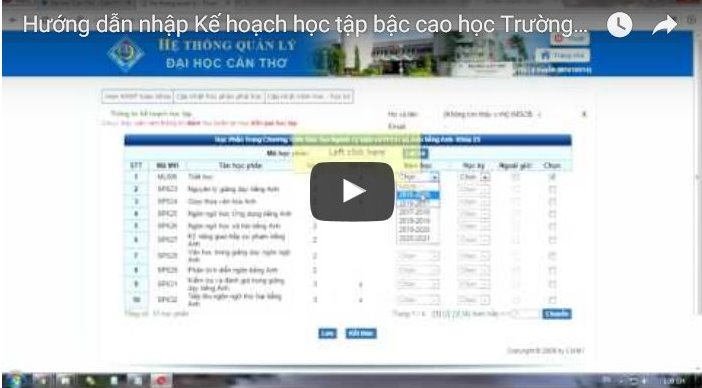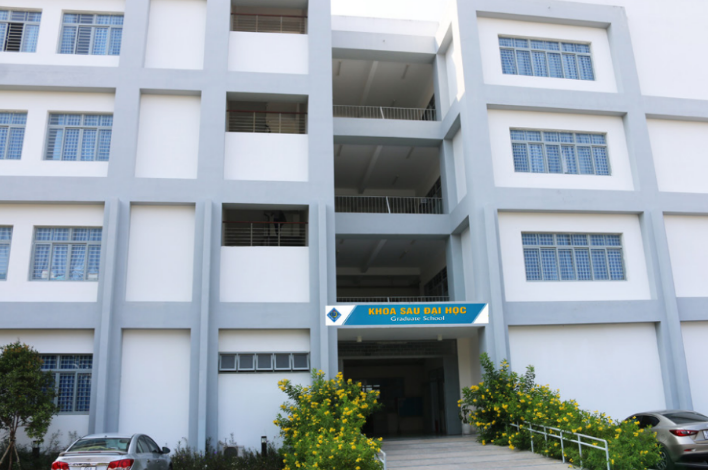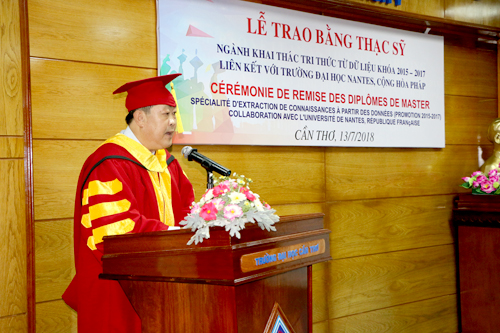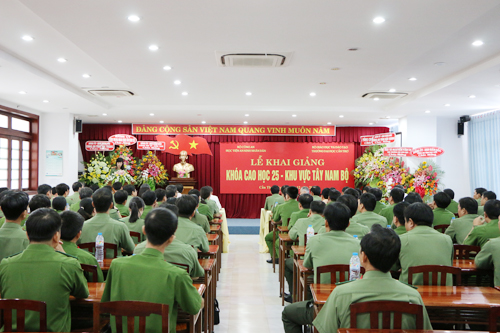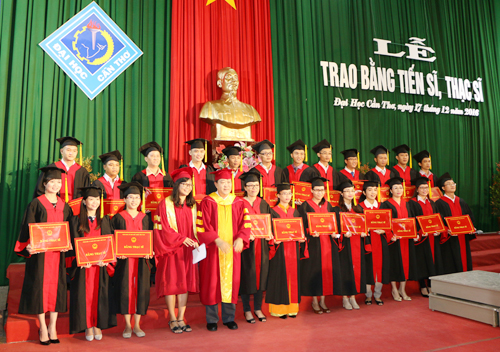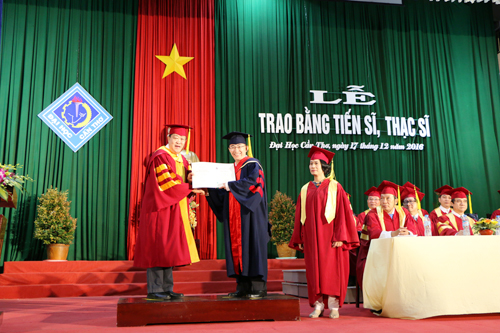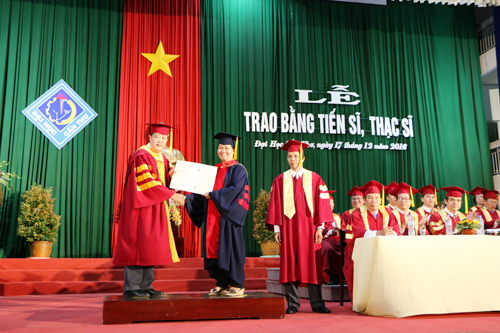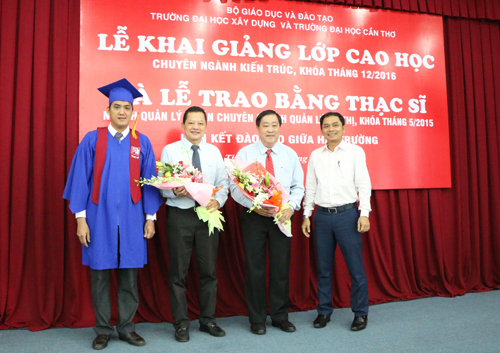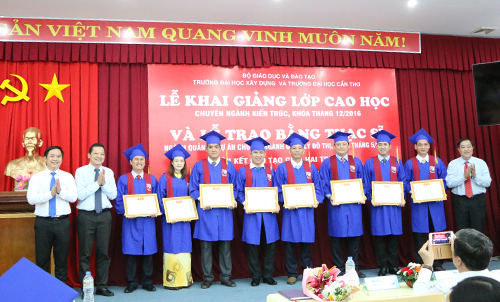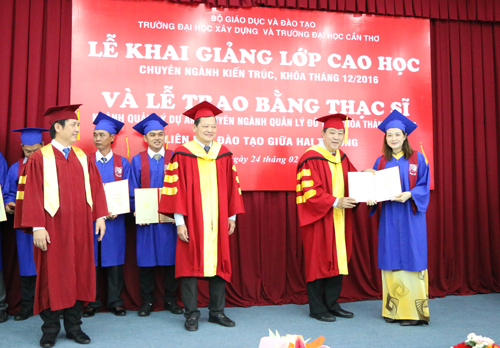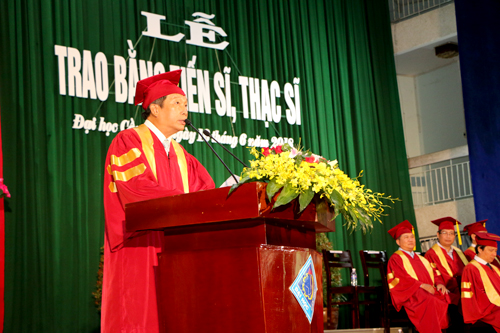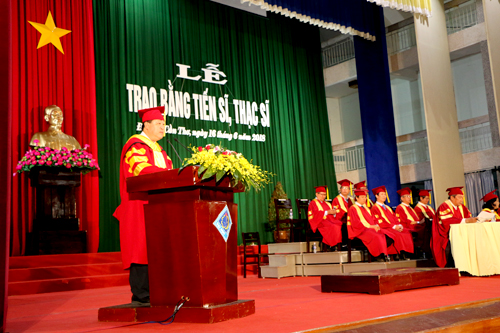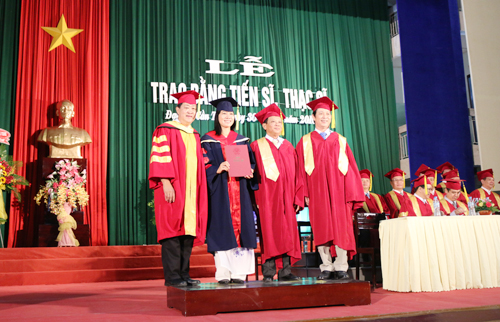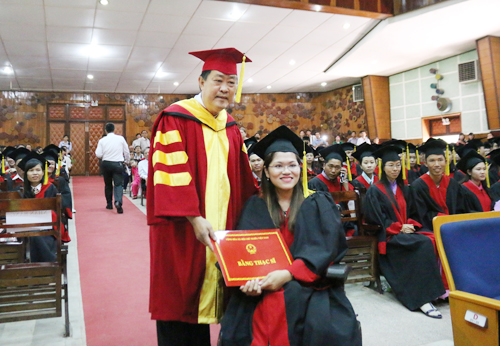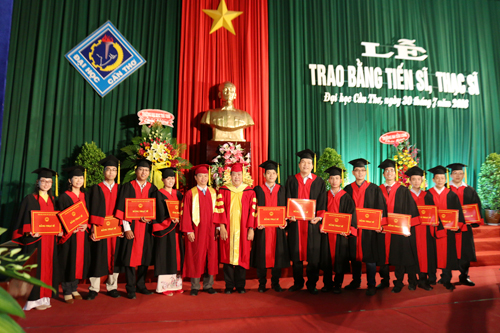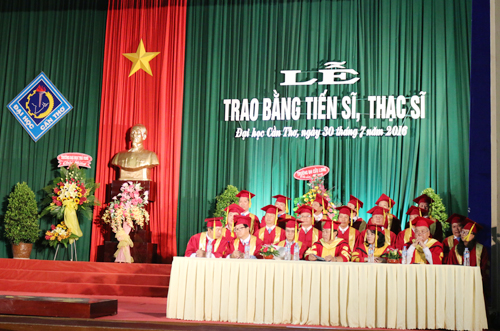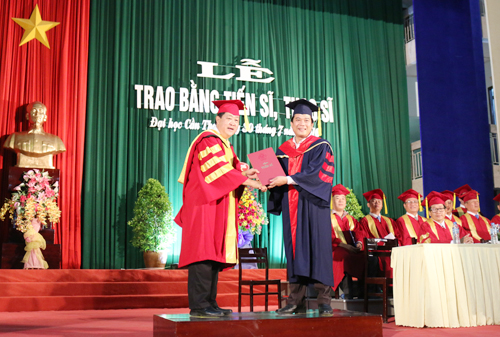
Tên đề tài: “NGHIÊN CỨU NĂNG LỰC CẠNH TRANH CỦA CÁC DOANH NGHIỆP XUẤT KHẨU THỦY HẢI SẢN VÙNG ĐỒNG BẰNG SÔNG CỬU LONG ”
Tác giả: Nguyễn Thị Lệ, Khóa: 2016
Chuyên ngành: Quản trị kinh doanh; Mã số: 62340102; Nhóm ngành: Kinh doanh và quản lý
Người hướng dẫn chính: PGS.TS. Huỳnh Thanh Nhã - Trường Đại học Kỹ Thuật Công nghệ Cần Thơ
Người hướng dẫn phụ: TS. Nguyễn Thiện Phong - Trường Đại học Tây Đô
- Tóm tắt nội dung luận án
Mục tiêu chung của luận án là nghiên cứu các nhân tố ảnh hưởng đến năng lực cạnh tranh và kết quả hoạt động xuất khẩu các doanh nghiệp xuất khẩu thủy hải sản vùng đồng bằng sông Cửu Long. Trên cơ sở đó đề xuất hàm ý quản trị nhằm nâng cao năng lực cạnh tranh và kết quả hoạt động xuất khẩu của doanh nghiệp xuất khẩu thủy hải sản vùng đồng bằng sông Cửu Long. Luận án có các mục tiêu cụ thể như sau: (i) Phân tích thực trạng năng lực cạnh tranh và kết quả hoạt động xuất khẩu của doanh nghiệp xuất khẩu thủy hải sản tại vùng ĐBSCL; (ii) Xác định và xây dựng thang đo cho các nhân tố ảnh hưởng đến năng lực cạnh tranh và kết quả hoạt động xuất khẩu của doanh nghiệp xuất khẩu thủy hải sản; (iii) Xác định và đo lường ảnh hưởng của các nhân tố đến năng lực cạnh tranh và kết quả hoạt động xuất khẩu của doanh nghiệp xuất khẩu thủy hải sản tại vùng ĐBSCL và (iv) Đề xuất một số hàm ý quản trị nhằm giúp nhà quản trị doanh nghiệp xuất khẩu thủy hải sản trong chiến lược nâng cao năng lực cạnh tranh và kết quả hoạt động xuất khẩu.
Số liệu thứ cấp của luận án được thu thập từ Tổng cục thống kê, Cục thủy sản và hiệp hội thủy sản. Số liệu sơ cấp được thu thập từ điều tra qua bảng câu hỏi, với 295 quan sát là cấp quản lý đang làm việc tại 295 doanh nghiệp có hoạt động xuất khẩu thủy hải sản vùng Đồng bằng sông Cửu Long. Luận án sử dụng phương pháp thống kê mô tả để mô tả thực trạng của các doanh nghiệp xuất khẩu thủy hải sản vùng ĐBSCL. Dữ liệu thu thập được đánh giá độ tin cậy theo hệ số Cronbach’s Alpha, phân tích nhân tố khám phá EFA, phân tích nhân tố khẳng định CFA, phân tích theo mô hình cấu trúc tuyến tính SEM. Luận án được thực hiện nhằm hệ thống hóa các cơ sở lý thuyết về năng lực cạnh tranh và kết quả hoạt động xuất khẩu của doanh nghiệp. Xác định và đo lường các nhân tố ảnh hưởng đến năng lực cạnh tranh và kết quả hoạt động xuất khẩu của doanh nghiệp trong phạm vi các doanh nghiệp hoạt động xuất khẩu thủy hải sản vùng ĐBSCL. Thông qua phân tích thực trạng và mối quan hệ giữa các nhân tố trong mô hình nghiên cứu, luận án đề xuất một số hàm ý quản trị để giúp các doanh nghiệp xuất khẩu thủy hải sản trong vùng nâng cao năng lực cạnh tranh nhằm hướng đến tăng cường hiệu quả của hoạt động xuất khẩu.
- Những kết quả mới của luận án
Kết quả nghiên cứu thực nghiệm cho thấy mô hình nghiên cứu được xây dựng trên nền tảng lý thuyết của mô hình năm áp lực cạnh tranh và thuyết năng lực (CBV) có ý nghĩa thực tiễn cao trong trường hợp các DN xuất khẩu thủy hải sản vùng ĐBSCL. Năng lực cạnh tranh của DN chịu sự ảnh hưởng bởi nhiều nhân tố thuộc mô hình năm áp lực cạnh tranh, trong đó khả năng kiểm soát áp lực từ nguồn cung ứng nguyên liệu đầu vào ảnh hưởng lớn nhất và cũng là nhân tố quan trọng nhất chi phối năng lực cạnh tranh của DN. Ngoài ra thì nhân tố khả năng kiểm soát áp lực người mua và sản phẩm thay thế được chứng minh có ảnh hưởng tích cực đến năng lực cạnh tranh của DN. Một nhân tố mới được xây dựng riêng vì đặc thù của ngành xuất khẩu thủy hải sản là việc thực hiện đạo đức và trách nhiệm xã hội của DN. Nhân tố này được chứng minh thuyết phục có sự tác động đến năng lực cạnh tranh của DN. Xét trên kết quả hoạt động xuất khẩu của DN, năng lực cạnh tranh của DN được chứng minh ảnh hưởng mạnh nhất đến kết quả của DN. Tiếp đó, các nhân tố như năng lực quản lý, khả năng áp dụng chiến lược marketing xuất khẩu và khả năng riêng của DN ảnh hưởng đến kết quả hoạt động DN.
Dựa trên kết quả nghiên cứu, một số hàm ý quản trị được đề xuất: Nâng cao khả năng kiểm soát áp lực từ nguồn cung thông qua các biện pháp để đảm bảo DN nắm quyền chủ động trong việc quyết định lựa chọn đơn vị cung ứng nguyên liệu và đảm bảo nguyên liệu đầu vào đáp ứng các yêu cầu đúng quy chuẩn mà DN quan tâm; Nâng cao khả năng kiểm soát áp lực từ người mua thông qua việc chủ động tiếp cận thị trường, mở rộng đối tượng khách hàng và chủ động trong kênh phân phối; Nâng cao khả năng kiểm soát áp lực từ sản phẩm thay thế thông qua việc tăng cường và đảm bảo chất lượng sản phẩm hiện có, xây dựng thương hiệu, đa dạng hóa sản phẩm, chú trọng phát triển các sản phẩm gia tăng; Tăng cường thực thi các chuẩn mực đạo đức và trách nhiệm xã hội bao gồm đảm bảo an toàn vệ sinh thực phẩm, kiểm soát yếu tố đánh bắt và nuôi trồng, kiểm soát hoạt động đánh bắt phải đảm bảo mục tiêu phát triển bền vững, tăng cường thực hiện bảo vệ môi trường trong quá trình hoạt động kinh doanh. Ngoài ra, để nâng cao kết quả hoạt động xuất khẩu của DN, điều quan trọng nhất là chú trọng nâng cao năng lực cạnh tranh, cần chú trọng vào tăng cường áp dụng các chiến lược marketing hiệu quả, tăng cường năng lực quản lý và chú trọng nâng cao kinh nghiệm hoạt động của DN.
- Các ứng dụng/khả năng ứng dụng trong thực tiễn, các vấn đề cần tiếp tục nghiên cứu:
Nghiên cứu đã hệ thống hoá và làm rõ lý thuyết về năng lực cạnh tranh, các quan điểm phân tích năng lực cạnh tranh và kết quả hoạt động xuất khẩu của DN nhằm ứng dụng trong lĩnh vực DN xuất khẩu thủy hải sản. Nghiên cứu đã xây dựng thang đo năng lực cạnh tranh và kết quả hoạt động xuất khẩu của các DN xuất khẩu thủy hải sản vùng ĐBSCL. Đây là nghiên cứu đầu tiên thực hiện tại ĐBSCL, khu vực đang phát triển trong quá trình đổi mới, tái cấu trúc trong bối cảnh hội nhâp quốc tế và cạnh tranh gay gắt cả thị trường trong và ngoài nước. Thêm vào đó, nghiên cứu đã xác định các nhân tố tác động đến năng lực cạnh tranh và kết quả hoạt động xuất khẩu của các DN xuất khẩu thủy hải sản và đã tìm ra mô hình kết nối mối quan hệ giữa năng lực cạnh tranh và kết quả hoạt động xuất khẩu của DN xuất khẩu thủy hải sản vùng ĐBSCL. Nghiên cứu này tìm ra năng lực cạnh tranh của DN chịu sự ảnh hưởng bởi nhiều nhân tố thuộc mô hình năm áp lực cạnh tranh. Một nhân tố mới được xây dựng riêng vì đặc thù của ngành xuất khẩu thủy hải sản là việc thực hiện đạo đức và trách nhiệm xã hội của DN. Nhân tố này cũng được chứng minh có tác động tích cực đến năng lực cạnh tranh của DN. Xét trên kết quả hoạt động xuất khẩu của DN, năng lực cạnh tranh của DN được chứng minh ảnh hưởng mạnh nhất đến kết quả của DN. Nghiên cứu đã đề xuất các hàm ý dựa trên kết quả mô hình nghiên cứu và phân tích thực trạng làm cơ sở để các DN xuất khẩu thủy hải sản xây dựng chiến lược hoạt động nhằm nâng cao năng lực cạnh tranh và phát triển bền vững. Vì thế, luận án là tài liệu tham khảo có giá trị cho những nghiên cứu tiếp theo.
Kết quả nghiên cứu có ý nghĩa thực tiễn cho các DN cùng các Sở, ban, ngành cụ thể như sau: Thứ nhất, đề tài nghiên cứu đã đem đến cho DN xuất khẩu thủy hải sản cái nhìn tổng quan hơn về năng lực cạnh tranh của DN. Đồng thời qua đó giúp DN nhận dạng những nhân tố đã và đang tác động nhất định vào năng lực cạnh tranh của DN. Từ đó có những giải pháp thích hợp để cải thiện và nâng cao năng lực cạnh tranh của DN. Thứ hai, kết quả nghiên cứu cũng cho các DN thấy rõ kết quả hoạt động xuất khẩu chịu sự chi phối bởi các nhân tố nào, từ đó có các chiến lược phù hợp để điều chỉnh kết quả hoạt động xuất khẩu theo mục tiêu đề ra. Thứ ba, dựa vào kết quả mô hình SEM đề xuất được các giải pháp và hàm ý quản trị để nâng cao năng lực cạnh tranh cũng như kết quả hoạt động xuất khẩu của các DN thủy hải sản vùng ĐBSCL. Phù hợp với điều kiện hội nhập toàn cầu và nâng cao kết quả hoạt động xuất khẩu của DN xuất khẩu thủy hải sản vùng ĐBSCL.
Trong quá trình nghiên cứu, luận án sẽ không tránh khỏi những hạn chế nhất định. Do hạn chế về thời gian nên phạm vi không gian trong luận án không xây dựng hết tất cả các chỉ tiêu phân loại DN trong biến kiểm soát mà chỉ kiểm định giả thuyết trên hai tiêu chí là loại hình DN và năm thành lập. Với loại hình DN, cơ bản vùng ĐBSCL tồn tại 4 loại hình DN thủy hải sản, tuy nhiên vì số lượng khảo sát trên hai nhóm còn lại quá nhỏ nên không xử lý mô hình SEM được. Ngoài ra, Việc xây dựng mô hình nghiên cứu thực hiện trước khi tình hình dịch bệnh Covid-19 tác động mạnh mẽ đến mọi mặt của hoạt động kinh doanh cũng như xuất khẩu của DN, vì vậy mô hình nghiên cứu đã không xem xét và đưa nhân tố tình hình dịch bệnh vào mô hình. Các nghiên cứu tiếp theo nên xem xét và mở rộng mô hình theo hướng đề xuất các nhân tố mới phù hợp với thực trạng xuất khẩu hiện nay.
Title: STUDYING THE COMPETITIVENESS OF SEAFOOD EXPORT ENTERPRISES IN THE MEKONG DELTA
Major: Business Administration Code: 9340101
Name of PhD student: Nguyen Thi Le Course: 2016 stage 1
Supervisor: Assoc.Prof. PhD. Huynh Thanh Nha
PhD. Nguyen Thien Phong
- Summary of dissertation content
The overall objective of the thesis is to study the factors affecting the competitiveness and export performance of seafood export enterprises in the Mekong Delta. On the basis of that, proposing administrative implications to improve competitiveness and export performance of seafood export enterprises in the Mekong Delta. The thesis has the following specific objectives: (i) Analyze the status of competitiveness and export performance of seafood export enterprises in the Mekong Delta; (ii) Identify and build a scale for factors affecting competitiveness and export performance of seafood export enterprises; (iii) Identify and measure the influence of factors on competitiveness and export performance of seafood export enterprises in the Mekong Delta and (iv) Propose some administrative implications to help managers of seafood export enterprises in strategies to improve competitiveness and export performance.
Secondary data of the thesis are collected from the General Statistics Office, Department of Fisheries and Fisheries Association. Primary data is collected from the questionnaires’ survey, with 295 observations are managers working at 295 enterprises with seafood export activities in the Mekong Delta. The thesis uses descriptive statistical method to describe the status of seafood exporters in the Mekong Delta. Collected data were evaluated for reliability by Cronbach's Alpha coefficient, exploratory factor analysis (EFA), confirmatory factor analysis (CFA), and analysis of Structural Equation Modeling SEM. The thesis is carried out in order to systematize the theoretiᴄal baѕiѕ on competitiveness and export performance results of enterprises. Identifying and measuring factors affecting the competitiveness and results of export activities of enterprises within the scope of seafood export enterprises in the Mekong Delta. Through analyzing the current situation and the relationship between factors in the research model, the thesis proposes some administrative implications to help seafood exporters in the region improve their competitiveness and increase the efficiency of export activities.
- New results of the thesis
The experimental results showed that the research models built on the theoretical foundation of the five competitive pressures model and the competences-based view (CBV) has high practical significance of the case of seafood export enterprises in the Mekong Delta. The competitiveness of enterprises is influenced by many factors of the model of five competitive pressures, in which the ability to control pressure on the supply of input materials has the greatest influence and is also the most important factor influencing the competitiveness of enterprises. In addition, the factor of ability to control buyer pressure and substitute products has been proven to have a positive influence on the competitiveness of enterprises. A new factor was built specifically because of the peculiarities of the seafood export industry is the ethical implementation and social responsibility of enterprises. This factor is proven convincingly to have an impact on the competitiveness of enterprises. Considering the results of export activities of enterprises, the competitiveness of enterprises has been shown to have the strongest influence on the results of enterprises. Next, the factors such as management capacity, ability to apply export marketing strategies and own capabilities of enterprises affected the performance of enterprises.
Based on the research results, some administrative implications are proposed: Improve the ability to control pressure from source of supply through measures to ensure enterprises take the initiative in deciding on materials supplier selection and ensure that input materials meet the requirements in accordance with the standards that enterprises are interested in; Improve the ability to control pressure from buyers through proactively approaching the market, expanding the customer base and being proactive in the distribution channel; Improve the ability to control pressure from substitute products through strengthening and ensuring the quality of existing products, building brands, diversifying products, focusing on developing augmented products; Strengthen the enforcement of ethical standards and social responsibility including guaranteeing hygiene and security of the food, controlling fishing and farming factors, controlling fishing activities to ensure sustainable development goals, strengthen the implementation of environmental protection in the course of business activities. In addition, in order to improve the export performance of enterprises, the most important thing is to focus on improving competitiveness, it is necessary to focus on increasing the application of effective marketing strategies, strengthening management capacity and focus on improving the operating experience of enterprises.
- The practical applications/applicability, the issues that need further research:
The research has systematized and clarified the theory of competitiveness, the viewpoints of analyzing the competitiveness and results of export activities of enterprises in order to apply in the field of seafood export enterprises. The study has built a scale of competitiveness and export performance of seafood export enterprises in the Mekong Delta. This is the first study conducted in the Mekong Delta, an area that is developing in the process of renovation and restructuring in the context of international integration and fierce competition in both domestic and foreign markets. In addition, the study has identified the factors affecting the competitiveness and export performance of seafood exporters and has found a model connecting the relationship between competitiveness and export performance and the results of export activities of seafood exporters in the Mekong Delta. This study finds that the competitiveness of enterprises is influenced by many factors under the model of five competitive forces. A new factor built specifically for the specificity of the seafood export industry is the ethical implementation and social responsibility of enterprises. This factor is also proven to have a positive impact on the competitiveness of enterprises. Considering the results of export activities of enterprises, the competitiveness of enterprises has been shown to have the strongest influence on the results of enterprises. The study has proposed implications based on the results of the research model and analysis of the current situation as a basis for seafood exporters to develop operational strategies to improve competitiveness and sustainable development. Therefore, the thesis is a valuable reference for further studies.
The research results have practical significance for enterprises as well as departments, boards, sectors specifically: Firstly, the research has given seafood export enterprises a better overview of their competitiveness. Thereby helping enterprises identify the factors that have had a certain impact on the competitiveness of enterprises. From there, there are appropriate solutions to improve and enhance the competitiveness of enterprises. Secondly, the research results also show enterprises clearly what factors their export performance is influenced by, thereby having appropriate strategies to adjust the results of export activities according to the stated objectives. Thirdly, based on the results of the SEM model, it proposes solutions and management implications to improve the competitiveness and export performance of seafood enterprises in the Mekong Delta. In line with the conditions of global integration and improving the export performance of seafood export enterprises in the Mekong Delta.
During the study, the thesis will inevitably have certain limitations. Due to time constraints, the spatial scope in the thesis does not build all the criteria for classifying enterprises in the control variable, but only tests the hypothesis on two criteria: type of enterprises and year of establishment. With the type of enterprises, basically there are 4 types of seafood enterprises in the Mekong Delta, however the number of surveys on the other two groups is too small, the SEM model cannot be processed. In addition, the research model was built before the Covid-19 pandemic had a strong impact on all aspects of business activities as well as exports of enterprises, so the research model did not consider and put the disease situation factor into the model. Further studies should consider and expand the model in the direction of proposing new factors that are suitable for the current export situation.
- Xem chi tiết nội dung luận án
- Xem thông tin đăng tải tại Website Bộ giáo dục và Đào tạo. (Nhập tên NCS vào ô tìm kiếm)

